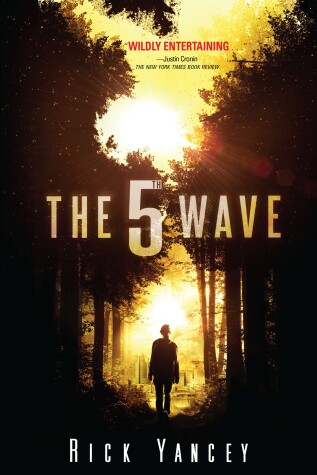Reviewed by Briana @ Pages Unbound on
In a world that has lost the majority of its population in a matter of months, children learn to be tough. Yancey introduces readers to a few of these survivors of the first, second, third, and fourth waves of alien attacks, whose lives unexpectedly interlock as they brace themselves for the fifth wave.
The book switches among multiple points of views, giving readers an intimate look at the lives and thoughts of each of the children. Often, particularly when a new POV is introduced, it is not clear until several pages into the chapter who is talking, creating a sense of disorientation that must be a less intense version of what the characters have felt since the aliens’ Arrival. The voices of these POVs do not sound incredibly distinct, but Yancey gives each character a few buzz words and thoughts so they seem unique enough for readers to believe each chapter is narrated by a different person.
Each person is focused first and foremost on survival, but the obstacles they face vary. Everyone has the problem of whom to trust: it is impossible to tell the difference between an alien and a human with the naked eye. Cassie, however, must also fight for her brother’s survival, and her promise to find him after he is taken from her carries her throughout the book. If she cannot keep her word, if she cannot find one person to care about when it seems everyone is going to die anyway, she is afraid she might lose her humanity completely. She is accompanied on her journey by Bear, her brother’s stuffed teddy to whom she grows particularly attached, in a way that might remind readers of Pressia’s symbolic attachment and clinging to the innocence of childhood in Julianna Baggott’s Pure. Other major characters include Evan, who wants to be responsible for Cassie’s survival, and Zombie, who wants to save another young child to atone for being unable to save his own baby sister. All have to navigate their prejudices and doubts and decide whether banding together, whether trusting, is one’s humanity’s strengths or flaws.
The plot, as one might expect, is incredibly tense. At any moment readers will expect an alien to round a corner and end it all for one of the protagonists; the protagonists expect this, too. Yancey also manages to maintain a high level of suspense far into the book. As he introduces new characters—both adult and children—he makes it difficult for readers to determine their motives. Just like the characters, readers have no idea whom to trust, who is human, and who is just pretending to be. The 5th Wave tests readers’ imaginations and critical thinking, asking them to run through the same calculations the characters must to survive: This person is either human or alien. If he is human, how would he act? If he were alien, how would he act? If he is not human, could he have any possible motive not to kill me? Should I kill him first?
Thematically, one can see that the book is incredibly interested in what being human even means. When everyone who looks like a human cannot be guaranteed to be one, characters start asking what other characteristics are essential. Problematically, the aliens seem to have far too many answers to that question, and are able to predict human behavior accurately enough to plot their attacks on the Earth to maximize human deaths. Recognizing the aliens’ knowledge, characters start searching deeper and try to discover what attributes they have that the aliens do not know about or do not have themselves. Can they be surprising enough to defeat the invaders?
The novel also takes an intimate look at death. I read The 5th Wave about the time I read Leo Tolstoy’s The Death of Ivan Ilyich, a recognized classic on the subject. The 5th Wave interestingly has rather similar thoughts when touching upon issues like what death means, how humans react to it, how they should react to it, and how much they think about it, The discussion might be a little dark, but the characters find it all too relevant. We always assume death will come for others but not for us. But as one character observes, it turns out there are only the past-dead and the future-dead. Death will come for all of us. We can only try to make the most of our lives and then go out the way we think best.
I am not, in general, an avid consumer of alien novels or movies. The only titles that come immediately to mind are E.T. and H. G. Well’s The War of the Worlds (both alluded to, along with a number of other science fiction works, in The 5th Wave). Yancey’s book, however, has opened me up to the possibilities of the genre. The writing is tight and exciting, the characters encounter drastic situations that push them to the limits of their abilities, and the plot explores what is means for us to be human at all. A highly recommended read.
Reading updates
- Started reading
- 28 June, 2013: Finished reading
- 28 June, 2013: Reviewed
